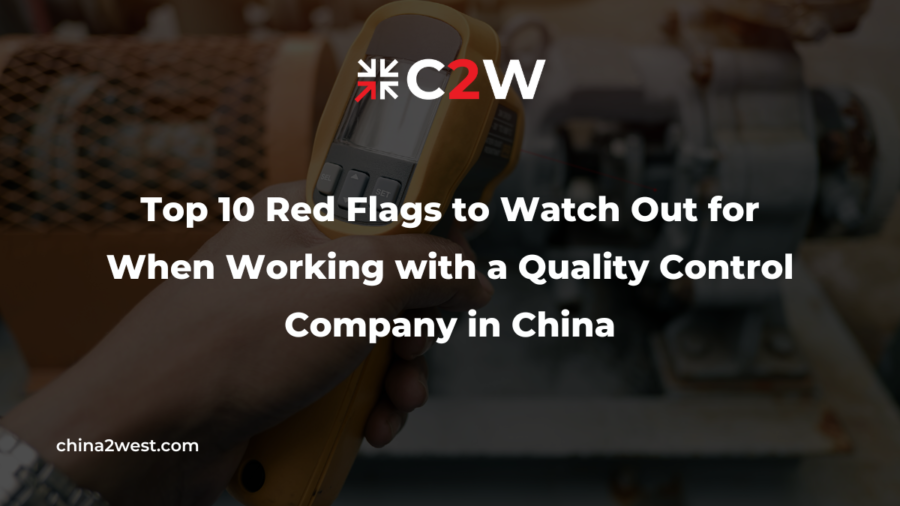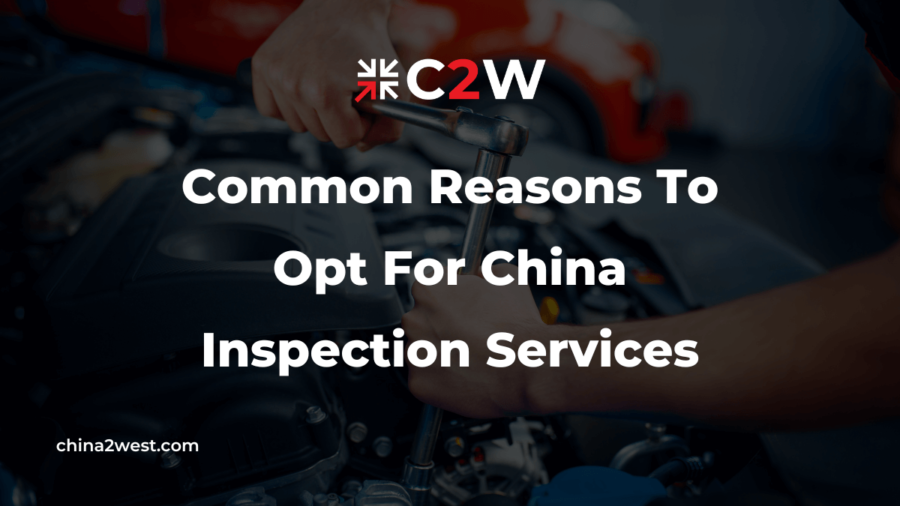When it comes to outsourcing production to China, quality control can’t be overlooked. Whether you’re producing simple items or sending products from China to your home country, you want to be sure that your items will be made and sent safely, securely, and above all, without defects.
If you want to work with a quality inspector in China to help check your products to avoid being defective, it’s important to be aware of potential red flags that could indicate issues with the company’s services.
In this post, we’ll explore 10 potential red flags to watch out for when working with a quality control company in China and provide tips on how to avoid these issues. Let’s dive in!
1. Insufficient Experience or Expertise
A reputable quality control company should be transparent about its experience, qualifications, and capabilities. Also, they should be willing to provide references, case studies, and other evidence of their past work to demonstrate their expertise and track record.
It’s essential to work with a quality control company that has significant experience in your industry and understands your products’ specifications and requirements. If a company lacks experience, it may not have the necessary knowledge to identify potential quality issues or provide effective solutions.
2. Inadequate Staffing
If the company does not have enough staff to handle its workload, it may not be able to provide the level of service and attention to detail required for effective quality control.
This can lead to delays in the inspection process, errors and oversights in the inspection report, and a lack of follow-up and support after the inspection. Inadequate staffing can also indicate that the company is more focused on maximizing profits than providing quality services to its clients.
3. Lack of Proper Accreditation and Certification
Accreditation from organizations such as the International Organization for Standardization (ISO) or the American Society for Quality (ASQ) can demonstrate that the inspection company has met certain standards and best practices.
Without proper accreditation and certification, there is no guarantee that the company is following recognized quality control practices. Make sure to ask about their accreditations and certifications and verify them independently if possible.
4. Inadequate Communication and Response Time
A dependable inspection company should be able to quickly and easily get in touch with and you can discuss any issues that may arise or ask questions. When it comes to responding, you should expect timely and accurate responses so that any problems can be addressed right away.
If you find that the company is slow to respond or lacks effective communication, this could be a major red flag. Delayed communication or response times can significantly slow down your operations and increase the risk of product issues that could have been avoided if they had been addressed quickly. So, make sure your QC partner is responsive and has clear communication channels in place.
5. No Quality Control Manual
When selecting a quality control company in China, it is important to make sure that they have a quality control manual in place. A quality control manual is a document that outlines the company’s policies and procedures for quality assurance.
It should include information about the company’s internal processes and standards for product inspection. Without a quality control manual, it will be impossible for a company to ensure consistent and reliable quality. Furthermore, the absence of a quality control manual can also be an indication that the company is not taking the quality inspection process seriously.
6. Lack of Local Presence
As China is a huge country with millions of factories, many inspection companies have seen the potential to establish multiple offices within the country in order to better serve the vast number of clients at home and abroad.
Without serval on-the-ground presences, the QC company may struggle to conduct on-site inspections and audits, which are critical for ensuring product quality. This can result in a higher risk of defects and quality issues, which can harm your business and reputation.
7. Avoid Talking About Their Previous Clients
Typically, many inspection companies would like to share their previous projects with a new client because that can be a direct way for a newcomer to have a better understanding of the inspection process.
However, if your potential quality assurance company is unwilling to provide references or discuss their previous clients, that can be a red flag. A lack of transparency in this area may indicate that the company has something to hide or has had issues with previous clients. Make sure to ask for references or case studies of their previous work and reach out to those references to verify their experience with the company.
8. Poor Quality Reports
Every quality assurance company should provide a quality report after the inspection. A good quality report should be thorough, accurate, and easy to understand, providing clear information about any issues or defects found during the inspection process.
If the quality reports provided by your QC partner are unclear, incomplete, or lack detail, it can be difficult to make informed decisions about your products. To avoid this red flag, it is important to carefully review any quality reports provided by a quality control company in China, paying close attention to the level of detail and accuracy provided.
9. Unrealistic Promises
If a quality control agent promises to deliver results that seem too good to be true or are significantly better than what other companies in the industry are offering, this should raise a red flag.
This is because if you use a company that is over-promising in order to win your business, it may not be able to deliver on its promises eventually, resulting in disappointment and losses.
10. Skipping a Legal Contract
A legal contract is crucial for outlining the terms and conditions of the agreement between you and your QC partner.
Without a legal contract, you may be putting your business at risk, such as failure to fulfill the project, delays, or confidential information leakage. Make sure to work with a company that is willing to sign a legal contract that outlines the scope of the project, fees, timelines, and dispute resolution procedures.
Don’t Let Product Defects Keep You from Achieving Success
In summary, when working with a quality control company in China, it’s important to be aware of potential red flags that could indicate issues with the company’s services. To avoid these red flags, it’s important to do your due diligence and thoroughly research potential QC partners before entering into a contract. Ask for references, verify accreditations and certifications, and make sure to have a clear understanding of their procedures, fees, and reporting methods.
When product quality is essential for the success of your business, China 2 West’s QC services have you covered. Our specialized team and resources can give you a competitive advantage in achieving your desired goals and ensuring customer satisfaction.
We go above and beyond when it comes to monitoring and maintaining your product’s quality in every stage of the process, from pre-production inspection to shipment and everything in between. Give yourself peace of mind and experience true quality control by contact us today.




